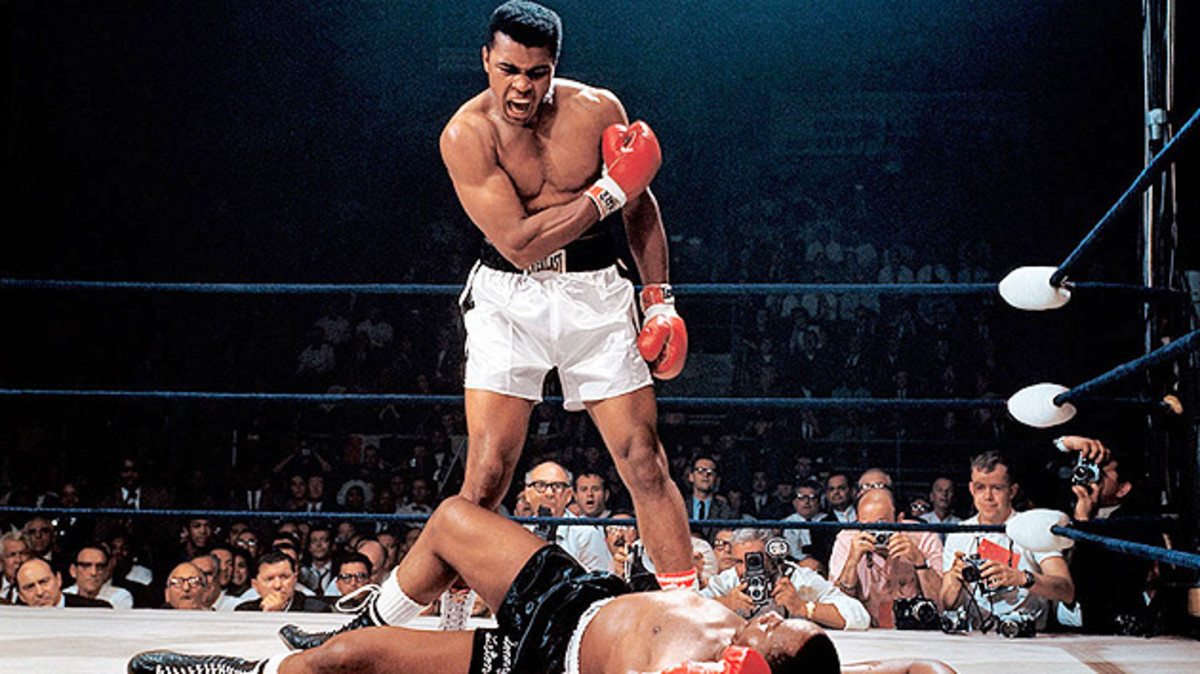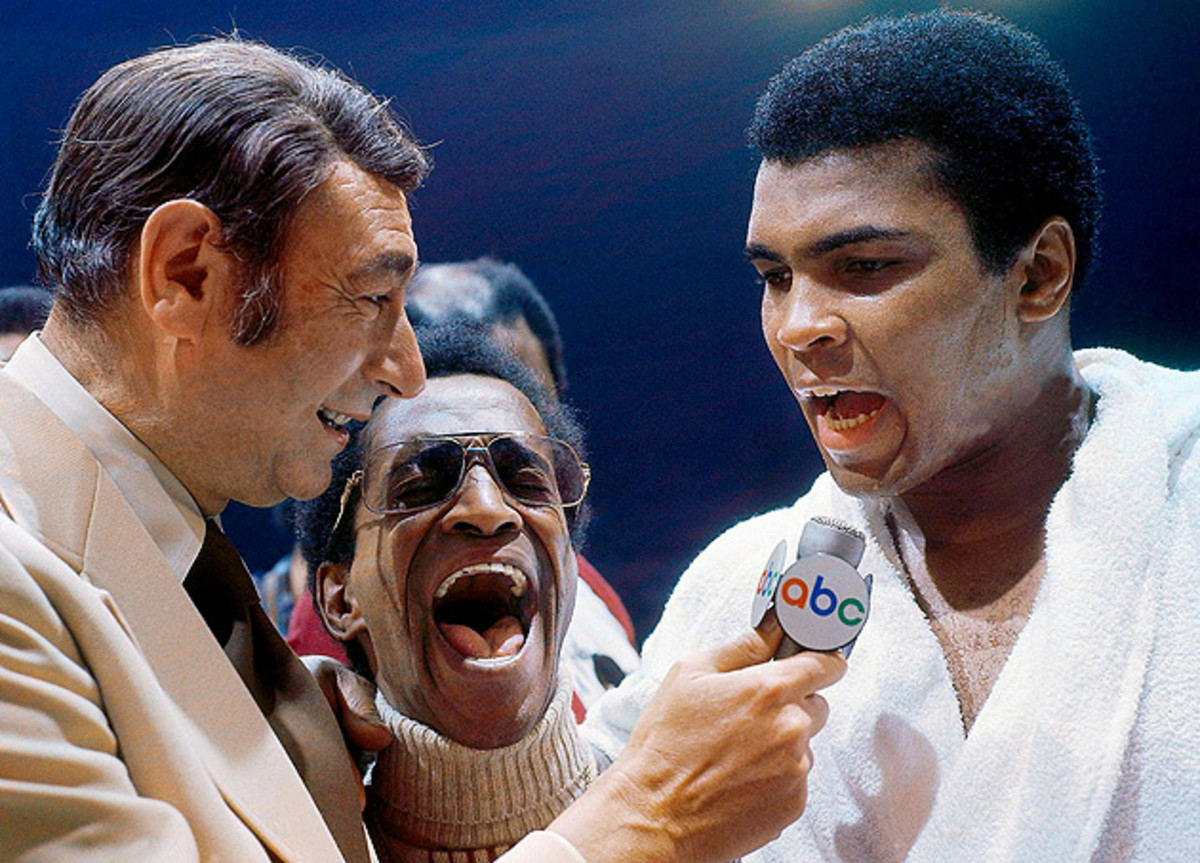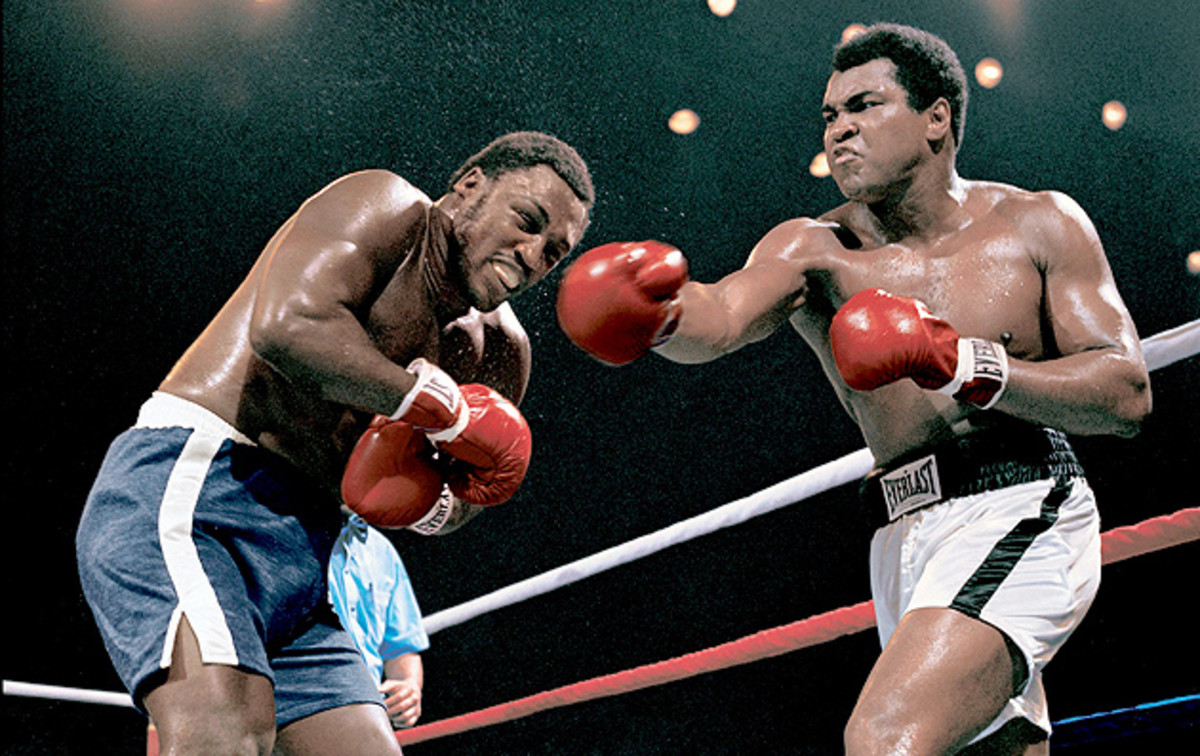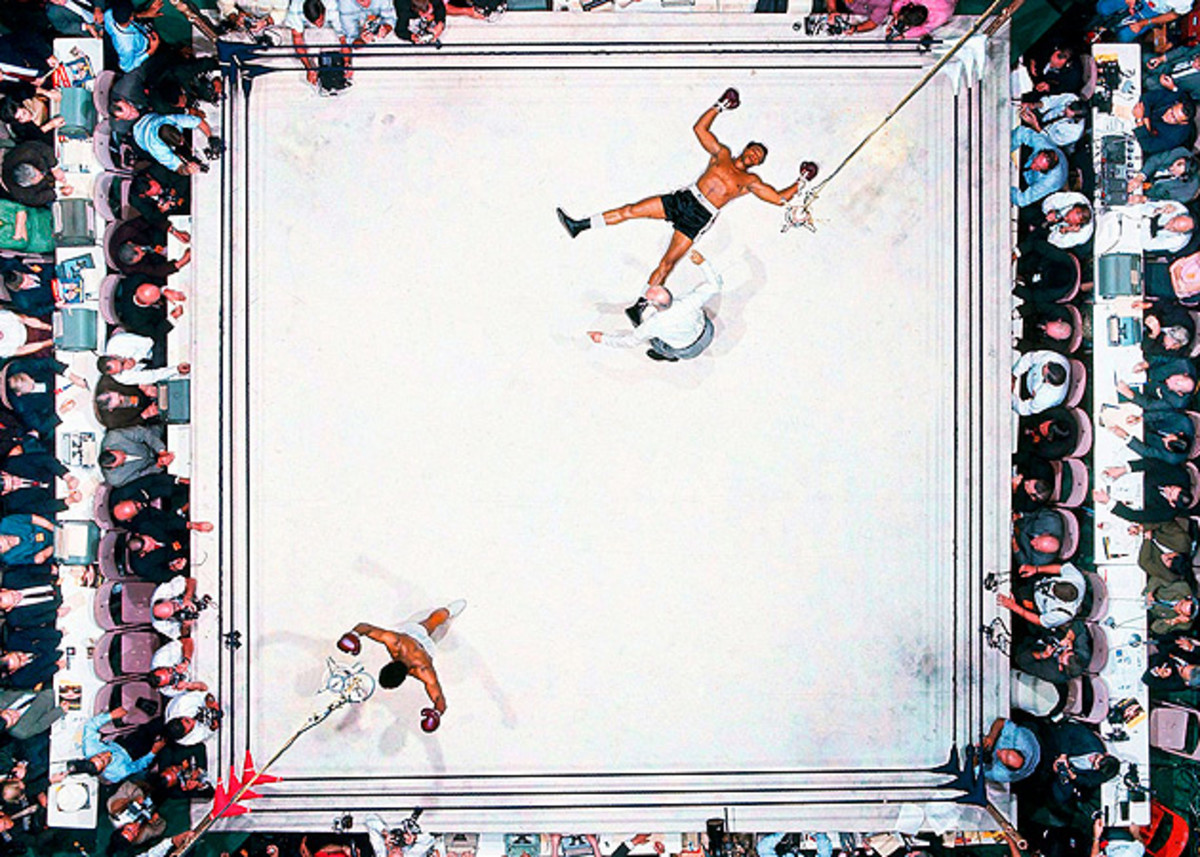The Legacy: At 73, Muhammad Ali remains an inspirational force

To honor Muhammad Ali, whose lifetime of achievement forever changed the world, SI is renaming its Legacy Award the Sports Illustrated Muhammad Ali Legacy Award. The honor will celebrate individuals whose dedication to the ideals of sportsmanship has spanned decades and whose career in athletics has directly or indirectly impacted the world.
There were three chairs, arranged side by side. Two of them were utilitarian, composed of bent-steel tubing and hard-cloth seats. The one in the middle was different: It looked like a miniature throne, with ornately carved white wood and thick powder-blue cushions. This is where Ali sat for the photos. He wore a black suit with an eggshell-white shirt, a dark tie and dress shoes polished to a glittering shine. His eyes were hidden by large dark glasses. The hair at the top of his head has thinned to near baldness. Behind the chairs was a portable backdrop bearing the logos of The Muhammad Ali Center, here in his native Louisville; the third annual Muhammad Ali Humanitarian Awards, which would be given on this September night at this downtown hotel; and a giant foods corporation that also sponsors the Kentucky Derby.
In a room outside, people waited in line to have their pictures taken with Ali. There were about 40 who would be involved in the night’s program as either award recipients or presenters, plus their guests. Among them were an Academy Award–winning actress, a winner of multiple Olympic gold medals and a 13-year-old Pakistani girl who was being honored for her advocacy on behalf of disenfranchised young girls in the rural regions of her country. They all shuffled forward until they reached a doorway guarded by two security men in business suits. Even from there they could not see Ali, because a wide black velvet curtain had been hung from the ceiling. Only upon being admitted, two or three at a time, could they walk around the curtain and see the chairs and the champ.
Muhammad Ali appears on his 39th Sports Illustrated cover
Ali’s sister-in-law, Marilyn Williams, managed the photo operation with the urgency of a grade-school principal conducting a fire drill and with the peppy spirit of a cruise director. Muhammad, you remember him! Smile, Muhammad! She would rush forward and help Ali ball his right hand into a fist, which is difficult for him to do on his own because of Parkinson’s disease. She would put two fingers on his forehead and tip his head back, because surgery for cervical stenosis two years ago has made it difficult for him to hold his chin up for extended periods. Ali’s lips were pursed, his face expressionless. “That’s the Parkinson’s mask,’’ said his wife, Lonnie. “He feels emotions, but he can’t show emotion with his face.’’
The guests waited before taking their seats next to Ali or standing behind him, each with an air of reverence. Some of them smiled or made fists of their own. Some were moved to tears. One woman who would be honored later that night put her right arm over Ali’s shoulder and buried her face in the crook of his neck, sobbing quietly. “You feel his presence when you walk into the room,’’ said Dhani Jones, a former NFL linebacker who was a presenter at the night’s event. “Even though he can’t really communicate with you, you hope that just by being near him, something rubs off on you.’’
• Sports Illustrated to honor Ali with inaugural Muhammad Ali Legacy Award
Every minute or so, the photographer’s flash fired off a burst of light. How many times had Ali looked into these explosions? Thousands? Millions? The guests rose and walked away. Some touched Ali on the arm or the shoulder. (“Now I can die in peace,’’ said one man.) Others took their place, until there was no line anymore and the security staff gathered around Ali for a picture of their own. There were a dozen of them, youthful and strong like Ali once was. They were all too young to have known him then. A young woman assisting with public relations sat demurely next to Ali for a picture; she was younger still.
Finally a wheelchair was hustled in from behind the backdrop. Two security guards lifted Ali from the throne and into the wheelchair. Williams grabbed its handles and pushed Ali past the backdrop, through a narrow doorway and onto a service elevator for the one-floor ride up to the banquet hall, where people would be honored in his name. The picture room lay empty, yet memories had been made and held.
I got a feeling I was born for a purpose. I don’t know what I’m here for. I just feel abnormal, a different kind of man. I don’t know why I was born. I’m just here. A young man rumbling. I’ve always had that feeling since I was a little boy. Perhaps I was born to fulfill Biblical prophecies. I just feel I may be part of something—divine things. Everything seems strange to me.
— Muhammad Ali, to SI’s Gil Rogin, 1965
*****
From The Vault: Every Ali Cover Story
- Cassius Invades Britain
- My $1,000,000 Getaway
- Cassius—His Fight And His Future
- The Big Fight: Can Clay Do It Again?
- Cassius Clay vs. Sonny Liston
- The Fight You Didn't See
- The Big Fight: Clay vs. Patterson
- Cassius Clay: The Man, the Muslim, the Mystery
- The Big Fight: Clay vs. Terrell
- The Scramble For Ali's Title
- Ali-Clay; The Once And Future King?
- The Slugger And The Boxer
- End Of The Ali Legend
- The Future Is A Mist
- The Jaw is broken
- Ali Again
- Muhammad Ali: Sportsman Of The Year
- Boxing's New Barnum
- The Epic Battle
- Ali's Road Show Rolls On
- Ali's Desperate Hour
- The Champ Again
- Look Who's Back!
- He's No Liston. He's No Frazier.
- The Last Hurrah
- The Man And His Entourage today
- A Celebration Of Muhammad Ali
- Once And Forever
- Ali, Frazier Are Still Slugging It Out
- Who's That Guy With Howard Bingham?
- The Legacy: Ali Remains Inspirational Force
On the evening of Oct. 1, in Louisville, SI will honor Ali by inaugurating the Sports Illustrated Muhammad Ali Legacy Award. It will be given annually, in December, at the same time as SI’s Sportsman of the Year award, to honor a former athlete or other sports figure who has used the platform of sports to improve the world. The ceremony with Ali in Louisville comes 40 years to the day after his victory over Joe Frazier in the so-called Thrilla in Manila, a brutal 14-round bout that left both men lionized yet physically diminished. Ali would box 10 more times over the next six years, but that was the last of his truly great fights. Now 73, he is no longer able to do interviews and seldom appears in public. For this story Lonnie Ali allowed me to witness his interaction with guests, which was closed to the public and media. She helped connect me with some of Ali’s longtime friends, although several of his closest friends are gone. Wingman Bundini Brown is gone. Trainer Angelo Dundee is gone. Howard Bingham, the photographer who has been Ali’s dearest friend for more than half a century, is fighting health battles of his own. Lonnie also encouraged me to send questions to Ali by email and to give him a week or two to answer. A set of questions was sent to Lonnie on Sept. 11; answers came back on Sept. 23. She assured me the responses were Muhammad’s and added, “He doesn’t talk at length anymore, and that is reflected in his answers.’’
SI: We are inaugurating this award very close to the 40th anniversary of your fight with Joe Frazier in Manila. Does this fight hold a special place in your heart? Why?
Ali: Well, it was a tough fight. Joe almost won. It was a good fight for both of us. I would only think it’s special because it took everything from both of us. We both gave everything in that fight.
SI: Are there other boxing moments that are special to you?
Ali: Yes, when I won my first heavyweight title by beating Sonny Liston and when I won the heavyweight title for the third time, against George Foreman.
*****

The seven decades of Ali’s life cover a vast swath of American cultural transformation. There is little doubt that Ali is the most famous athlete in history and among the most famous humans. As Cassius Clay he won an Olympic gold medal in Rome in 1960, when many sports fans in the U.S. were World War II veterans and their children the first wave of the Baby Boom. As Muhammad Ali he lit the Olympic flame to open the 1996 Games in Atlanta, with the Vietnam War long passed. In one of his last major public appearances, during a telethon following the attacks on Sept. 11, 2001, he sat alongside actor Will Smith (who portrayed Ali in the eponymous biographical movie that would be released three months later) and struggled to explain his religion to the nation.
He was, for a very long time, the most polarizing of figures. On Feb. 25, 1964, when he was just 22 years old, he stopped the fearsome Sonny Liston to win the heavyweight title, loosing upon an unsuspecting—and overwhelmingly Caucasian—U.S. public and media an African-American sports star unlike any they had known. In front of cameras before and after that fight, he exhibited the showmanship that would help define his public persona. He recited his own doggerel—Float like a butterfly, sting like a bee—and promised not only to take out Liston but also to launch him into orbit. In the ring he was transcendent: a fighter with a big man’s power, a little man’s speed and a Renaissance painter’s creative genius. When that first title fight was over, he stood on the ring ropes, wide-eyed and full of life, waving his gloved right hand and shouting, “I am the greatest! I am the greatest! I’m the king of the world.’’
Shortly afterward he announced that he had joined the Nation of Islam and changed his name. In 1967, during the Vietnam War, Ali refused induction into the U.S. military as a conscientious objector, on grounds that his religion did not allow participation in war. More famously, he told a reporter, “Man, I ain’t got no quarrel with them Vietcong.’’ It stands as one of the seminal quotes of the 20th century. At the time public sentiment had not yet turned against the war, and Ali was vilified, cast alongside the youth whose antiwar passions were just beginning to find a voice. Columnist Milton Gross of the New York Post wrote, “As a fighter, Cassius is good. As a man, he cannot compare to some of the kids slogging through the rice paddies where the names are stranger than Muhammad Ali.’’
Ali was arrested and stripped of his title; he did not fight for 43 months, from age 25 (while physically vibrant and almost unbeatable) until he was nearly 29 (diminished, a creature of guile and courage). In his third fight back, on March 8, 1971, he lost a unanimous decision to Joe Frazier at Madison Square Garden in what remains one of the most significant prizefights in history. From that night forward, having risen from the canvas after Frazier knocked him down with the most perfect of left hooks, Ali was something else. Something beyond the beautiful and gifted child who ascended to greatness. Something more than the social activist who surfed the wave of a changing society. Something different from just a fighter or man.
For a decade Ali raged against his fading skills inside the ring, first taking back his title with a stunning 1974 victory over George Foreman in the so-called Rumble in the Jungle in Zaire and a year later beating Frazier in Manila. Two fights past Frazier, as Ali prepared to take on awkward journeyman Jimmy Young in Landover, Md., in the spring of 1976, he was honored by the Touchdown Club of Washington, D.C. In an odd stroke of promotional strategy, the award was presented by Ray Leonard, then 19 and training for what would be a gold-medal-winning performance at the Montreal Olympics. “I’m sitting up there next to Muhammad, and I am freaking out,’’ says Leonard. “His presence was just unreal. It’s still unreal. He looked me in the eye and told me I would be all right, and it just felt like the complete truth to me.’’ Afterward Ali gave Leonard three pieces of advice: Be your own man, sign your own checks and hire Angelo Dundee as your trainer (which Leonard did).
Ali staggered to the end of his career, as fighters often do. He gave up his title in an embarrassing loss to Leon Spinks in the winter of 1978, took it back seven months later at age 36 and finished with terrible losses to Larry Holmes and Trevor Berbick from which fans averted their gaze. For the more than three decades since then, Ali has battled with similar passion against the physical decline precipitated by Parkinson’s and accelerated by the beatings he absorbed in the ring, even in victory.
Ali became a vessel in which others would find their better selves, a symbol of perseverance against illness and of resistance to time itself, which surges ever forward. He would be defined less by his own actions than by people’s reactions to him, whether in a hotel ballroom or on the largest stages on earth.
SI: Throughout your life, you have touched people just by being yourself. How does this make you feel?
Ali: It makes me feel good, but I don’t know if I touch people like you’re saying. I only know because people tell me. It’s God’s blessing if I’m able to touch people and make them feel good about themselves and motivate them to do better.
*****

Ron DiNicola, a son of Italian immigrants who was a boxer in the U.S. Marines, came out of the military in the mid 1970s, graduated from Harvard and then Georgetown Law School and, in ’84, moved to Los Angeles and joined the old-line entertainment firm of Mitchell, Silberberg & Knupp. He met Howard Bingham, who subsequently took him to meet Ali at Ali’s mansion in the Hancock Park section of L.A. Soon thereafter, while Lonnie Ali was remaking Ali’s support team, she brought DiNicola on board. He has been there ever since, and the former champ has fascinated him. “When I first met Muhammad,’’ says DiNicola, 59, “he could walk in one door at the airport empty-handed and walk out with 16 deals sticking out of his pockets, some of which he had signed. He assumed the best in everyone.’’
DiNicola traveled the world with Ali and witnessed the remarkable power of his name. In 1993 they went to South Africa, arriving on April 10, the day of the assassination of anti-apartheid leader Chris Hani. “By the time we got into the terminal, there was pandemonium,’’ says DiNicola. “There was a convulsive emotion in the air. People were grieving, and it was as if they wanted to lay their grief at Ali’s feet, because they adored him so much. There was a lot of jostling, and security was getting rough with people and Ali just said to the police, ‘Cool it, cool it, ease up.’ They put a table in the doorway, and Ali stood on the table. The security people held his belt so that he could gesture without falling, and the crowd was just roaring and roaring.’’
On the night of July 19, 1996, in a surprise astonishingly kept secret until the last moment, Ali lit the flame to commence the Atlanta Olympic Games. He stood with the torch quivering in his right hand as he accepted the flame from Janet Evans, then 24, a swimmer who had won four gold medals in the previous two Olympics. A primal roar washed over the stadium. Evans, who was also competing in those Games, was told only the night before that she, as the penultimate torch-bearer, would be passing the flame to Ali, whom she knew only as an important name from some distant history. “I didn’t understand the reverence,’’ says Evans. “I didn’t understand it until the stadium started shaking, like an earthquake.’’
Evans had reached a crossroads in her own career. She had won three gold medals at 16 and another one at 20, but now she was unlikely to win any more (and, in fact, did not). “At that point in my life I was struggling to find the real meaning of the Olympics,’’ says Evans. “They are supposed to mean people getting out on that stage and doing their best. In America it means win gold medals. But then you see this man, and he’s come back to the Olympics, in the South, after the civil rights movement, and with his physical issues, and he was so courageous to stand there in front of the world.’’
Ali and Evans left the stadium immediately after the torch lighting, and Ali was hustled into a vehicle and driven away in a phalanx of Georgia state police vehicles. Evans’s ride took slightly longer to arrive, and she waited with a security guard on the sidewalk. “I never cried after winning a gold medal,’’ Evans says. “I hardly ever cry. But after Ali was whisked away, I just put my head on the security guy’s shoulder and started bawling.’’
After Ali agreed to participate in the 9/11 telethon, which took place at three locations 10 days after the attacks, he went to CBS’s Los Angeles studios with longtime friend Bernie Yuman, who first met Ali in 1962, when Yuman was 13, while jogging on a golf course in Miami. “We came into the studio that night,’’ says Yuman, “and all of these famous celebrities are manning the phones. They would come and go, but the action never stopped. Then Ali walked in, and everything did stop. All of the actors and stars stopped answering phones and crowded around Ali.’’ It is a familiar story: When Ali arrives, the room stops.
The source of his influence is difficult to pinpoint. DiNicola suggests that throughout the world outside U.S. borders, Ali is beloved for taking on his mighty government all those years ago. Leonard says, “He spoke up for people who couldn’t speak up for themselves.’’ There is also empathy for his health struggles. Thomas Hauser, who wrote the 1991 biography Muhammad Ali: His Life and Times, says, “There has been a concerted effort by many people in recent years to grind down the rough edges of Ali’s legacy, but there is also an aura of love and pure goodwill about Ali. In his presence, even people who didn’t like Ali liked Ali.’’ In the end, though, Ali has become that rarest of humans, beloved not mostly for what he did but simply for who he is.
SI: How would you like to be remembered as an athlete?
Ali: As the best heavyweight boxer of all time.
SI: As a person?
Ali: As a good person who tried to be kind to everyone.
*****

Ali spends most of his time in Arizona, where he is involved annually with the 20-year-old Celebrity Fight Night, a charity event that has raised more than $100 million. A portion of that benefits the Muhammad Ali Parkinson Center at Barrow Neurological Institute in Phoenix. Muhammad and Lonnie spend several weeks a year at homes in Louisville and Berrien Springs, Mich. The generations that have been touched by Ali’s life and career wonder about his health as his public appearances become more infrequent and more distressing to witness. “People want to know Muhammad is well,’’ says Lonnie. “It’s a remembrance of youth. If he’s O.K., they’re O.K.’’
Ali has been suffering from some form of Parkinson’s for 35 years, according to Lonnie, dating back to his final two fights. It is a progressive disease. In 2006 he fell several times, which family members attributed to the Parkinson’s but which was in fact mostly related to cervical stenosis, for which he underwent surgery. “It was corrected,’’ says Lonnie, “but it has compromised his balance.’’ Ali began using a walker shortly afterward and now also uses a wheelchair, although reluctantly. Last December he developed a urinary-tract infection and then contracted sepsis, which left him hospitalized and seriously ill for three weeks. His visit to Louisville in September was his first trip since that illness.
These ongoing health challenges, says Lonnie, have dulled Ali’s spirit in only some ways. He watches hours of television, often the Encore Western channel, but he also likes to pull up YouTube videos of his younger self. He enjoys the interviews more than the fights: images of a young man full of words and thoughts, shouted to a world unprepared for his spirit. He occasionally watches the fights, too, and other sporting events. He can converse but not always and not easily. “It’s the luck of the draw,’’ says DiNicola. “On a given day you might get more than on another day.’’
He loves the company of children but has difficulty smiling or laughing to demonstrate his happiness. “He doesn’t care about having Parkinson’s,’’ says Lonnie, “but he doesn’t like being the center of attention anymore. Muhammad was always an entertainer, and he can’t do that anymore. There was a time when you couldn’t take a bad picture of Muhammad. He was just a beautiful human specimen. Now he’s become very self-conscious about how he looks in photographs. He’s lost friends, and he gets melancholy about that. But people should know that Muhammad does not have regrets, except that he didn’t spend more time with his children. [Ali has nine.] But he has enjoyed every moment of his life.’’
It’s impossible to know for certain, of course, what lies deep in the man’s soul. A life so large, ending so small. But that is what life often does. Few people have left more behind than Ali. Few will be remembered longer.
SI: How do you feel?
Ali: Good.

